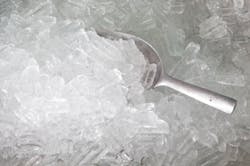Many people turn to water filtration technologies to improve the flavor and odor of tap water, but did you know they can also improve the quality of ice? This article examines what makes ice taste and smell badly and offers suggestions of how to treat water to make the best ice possible.
The purpose of ice in drinks
Americans love cold drinks, making ice indispensable to the beverage industry. For most drinks that are meant to be consumed quickly such as fountain soft drinks, the purpose of ice is to make the drink cold enough for long enough for the consumer to finish the beverage before the ice melts enough to water it down.
Bartenders use ice to chill drinks, but they also allow melting water from the ice to subtly flavor a mixed drink. Part of their skill involves knowing how much to shake or stir a drink to chill it without adding in too much or too little water.
Water coming in
All ice machines recommend using filtered water. Why? If scale deposits are not filtered out, they will rapidly build up on internal components and damage the machine. Mineral deposits and other solids present in the water will also make ice cloudy in appearance and can ruin the appeal of a mixed drink. Considering this, the way to improve your ice is to get the mineral content of your water tested and the right filter put in place to soften the water to acceptable levels.
If the water is chlorinated, then you must filter out the chlorine before it hits your ice maker. Chlorine won’t necessarily damage your system, but ice made from chlorinated water can smell like pool water as it melts. Trapped chlorine gas in the water is freed rapidly when it is frozen and then melted again.
You can also watch for excess sodium and excess iron in the water. Excess sodium makes soft cloudy cubes that melt faster than expected and can cause buildup such as calcium and magnesium in hard water. Excess iron is dangerous because it is a food source for certain bacteria. Another source for weird odors and tastes in ice is dissolved organic material. For instance, tannins can turn water brown and give ice an earthy flavor.
The key to great tasting ice is to use water that is as pure as possible. This may necessitate installing both a water softener and a standard water filter to remove chlorine and biological contamination. If you are noticing an off-flavor in your ice, check your filters and consider getting water than has run through the filter tested.
Contamination in the bin
The other major cause of contamination is using the ice bin improperly. You might be surprised how many people think that the cold temperature in an ice bin is enough to kill bacteria. The temperatures in an ice bin will only slow down contamination. In fact, if you’re experiencing a strange flavor or smell from ice that isn’t chlorine, the first thing you should check is whether the ice bins or scoops are contaminated.
Some common ways that ice bins get contaminated are:
- Leaving the lid open
- Using hands or a glass to scoop ice instead of a proper scoop
- Allowing your hands to touch the ice while using the scoop. Some scoops have hand guards to prevent this.
- Allowing the scoop to rest on unsanitized surfaces
- Not cleaning and sanitizing the ice bin, including the seals on the doors, on a regular basis
Even with antimicrobial surfaces and UV lights, the inside of an ice bin can become the host of a bacterial colony. If at any time you see slime, mold or discoloration on ice bin walls, the problem has gone too far. Much like how a small mold spot on a loaf of bread means the whole loaf is contaminated, you should treat all ice in a bin as suspect if you see these signs of bacteria.
You should clean and sanitize an ice bin at least as often as the manufacturer recommends, but local health laws may require more regular cleanings. This is a commonly missed item on health inspection reports. Don’t forget to sanitize the scoop as well.
If the water coming into your ice machine is treated correctly and workers maintain the cleanliness of the ice bin, there should be no problems with strange odors or smells coming from your ice cubes.
Mark Masterson writes for IceMachinesPlus.com and has more than 10 years of experience in the restaurant and bar industry. He provides information and advice to managers and contractors about the best practices for choosing the right type of ice machine.
